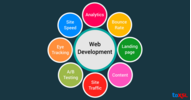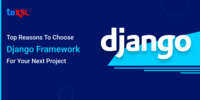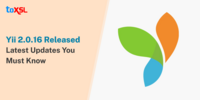- Mar 18, 2024
Share this post on:
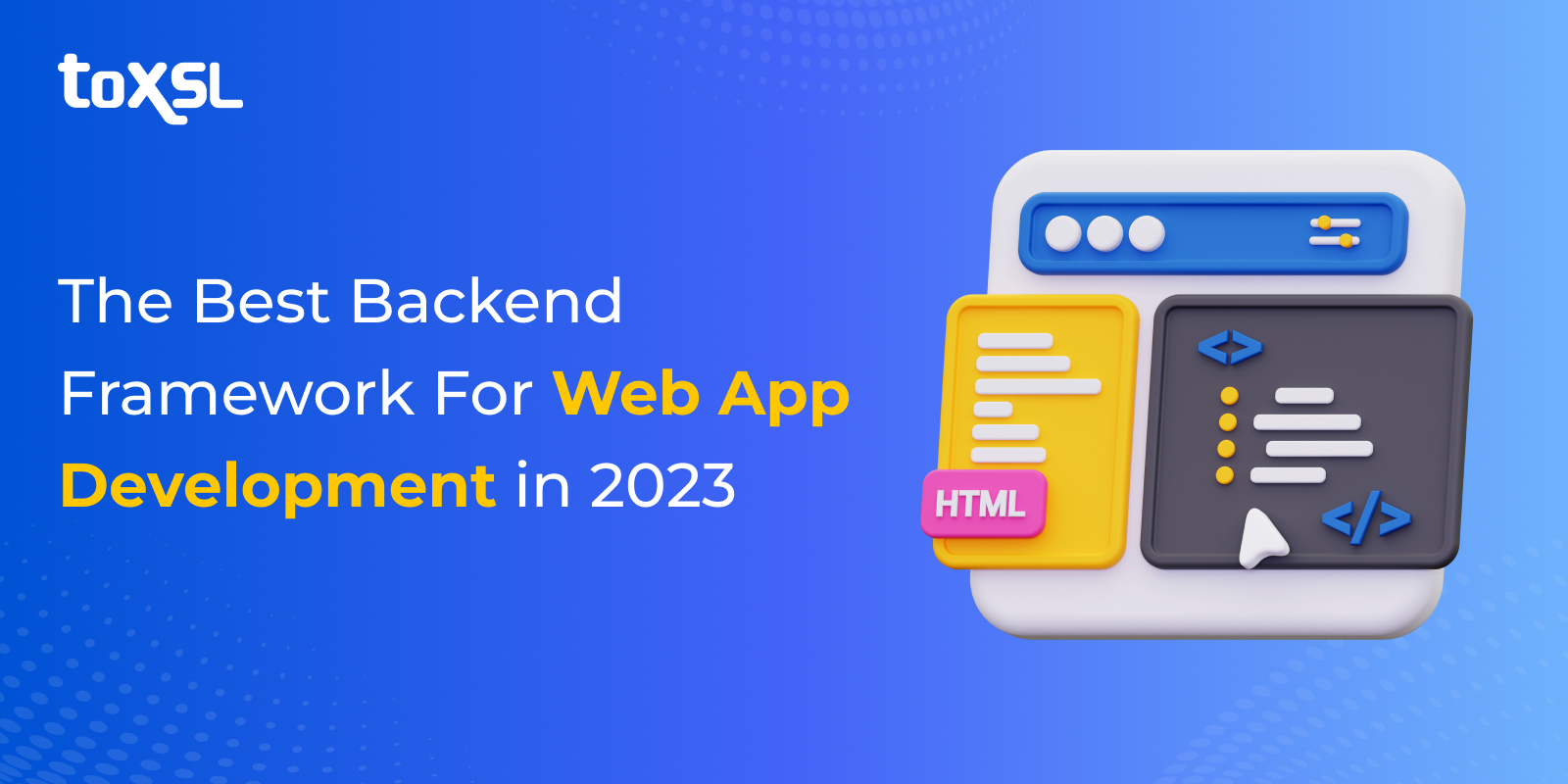
Over the past few years, businesses have seen numerous technological changes that have enhanced competition in the market. Nowadays, industries are experiencing a great deal of difficulty and significant changes. The market is evolving and with that new trends are constantly emerging. Businesses must keep up with emerging technology to stay ahead.
So, what can be the most crucial aspect of a business? Well, the vital aspect of any business is its web applications. This is achieved only with the help of backend development.
When it comes to developing modern web applications, choosing the right backend framework is crucial to ensure the scalability, reliability, and maintainability of your application. In this article, we will explore the top backend frameworks that can help you build robust and efficient web apps.
We have considered several factors, such as popularity, ease of use, performance, security, and functionality while compiling our list of top backend frameworks.
What are the different types of web frameworks?
There are various web frameworks, each serving its purpose and used in a large range of applications. Generally speaking, we can categorize web frameworks into two main groups based on their core responsibilities: Client-side Framework and Server-Side Framework (Backend Web Frameworks).
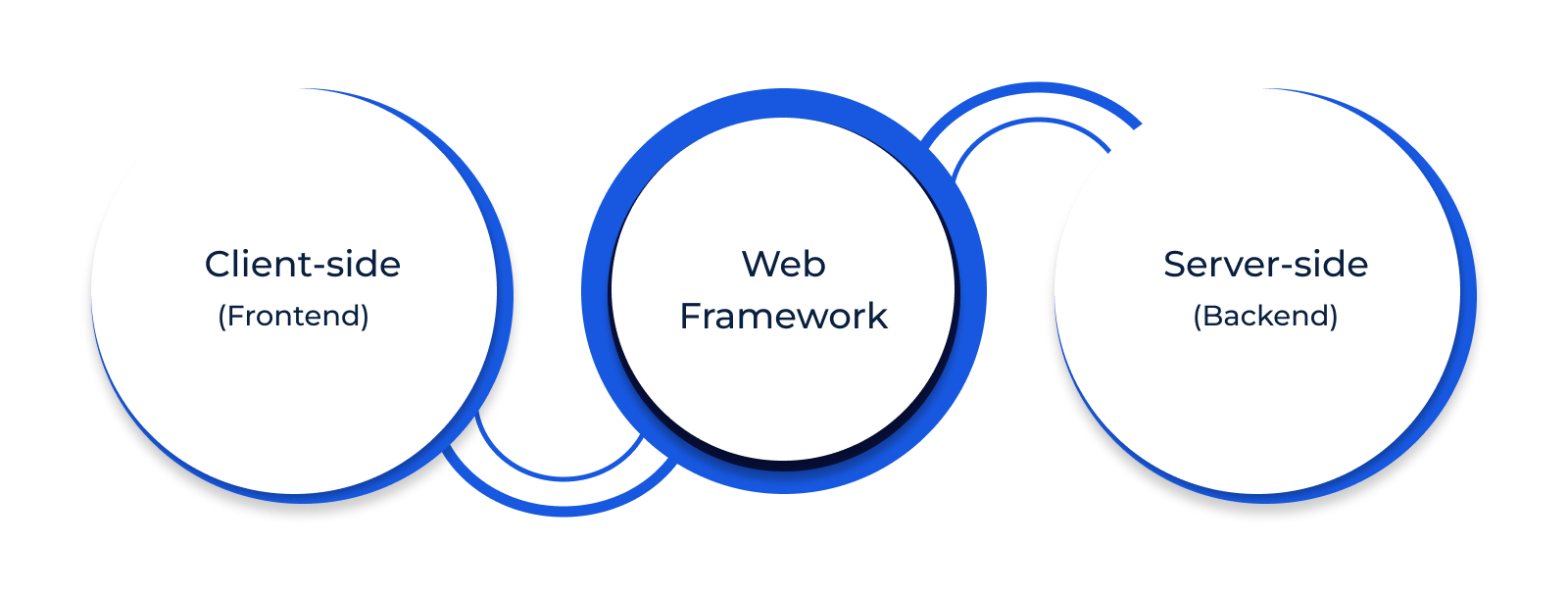
Let us explain in detail.
Client-side frameworks (Frontend Web Frameworks): Client-side frameworks, also referred to as "front-end" frameworks, are downloaded from the server and installed on the end user's browser or device. They work with the presentation layer of a website or an application, ensuring smooth interactions between users and the interface. Examples of client-side frameworks are React, Angular, Vue, and jQuery. These frameworks facilitate rapid development cycles by encapsulating essential functions and optimizing cross-browser compatibility.
Server-Side Frameworks (Backend Web Frameworks): Server-side frameworks run on remote servers and manage incoming requests, process data, generate dynamic content, connect to databases, and return responses. These frameworks typically use languages such as PHP, Python, Java, or .NET, which help build powerful web applications. Some prime instances of server-side frameworks are Express, Flask, Django, Node.js, Ruby on Rails, and ASP.NET Core.
Benefits of using a backend framework for your website
In today's fast-paced digital world, having a well-functioning website that can handle large amounts of traffic and data storage is crucial for business success. A backend framework provides developers with pre-written code and tools that enable them to build dynamic web applications quickly and efficiently. It means that developers do not have to spend time coding from scratch, resulting in faster development times and lower overall costs. Some common backend frameworks include Ruby on Rails, Django, Express (Node), Flask (Python), and Laravel (PHP).
Let us explore why a backend framework is essential and how it can benefit your website.
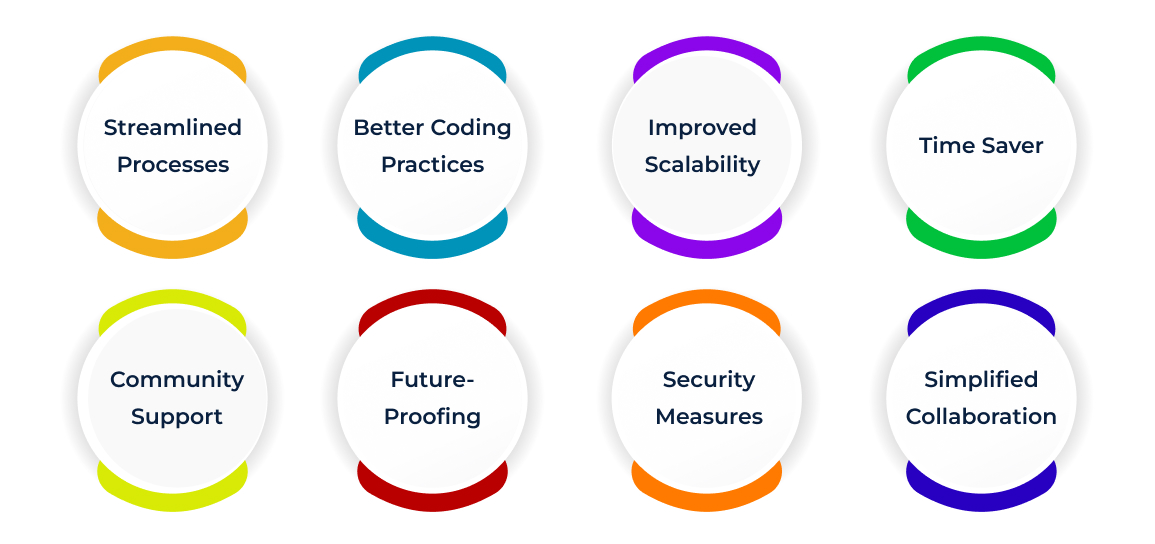
- Streamlined Processes: A backend framework gives access to tools and resources that streamline repetitive processes, such as user authentication and database management. As a result, developers can spend more time on customizations and innovations specific to the client's needs.
- Better Coding Practices: Using a backend framework promotes better coding practices because developers work within established guidelines and design patterns. It ensures consistent coding standards throughout a project, which makes it easier to maintain and update the code over time. Additionally, a backend framework includes built-in error handling and security features, reducing vulnerabilities and potential breaches.
- Improved Scalability: One of the main advantages of using a backend framework is improved scalability. Web frameworks allow websites to handle increased traffic loads. They offer built-in caching mechanisms to speed up page load times, enhance the user experience and increase conversions.
- Time Saver: By employing a backend framework, you save significant time and effort in developing and maintaining your site. It allows you to focus on other critical aspects of your business. Pre-built modules and libraries in popular frameworks like ReactJS or AngularJS reduce the amount of manual coding required while still delivering top-notch functionality.
- Community Support: Most backend frameworks have developer communities that share knowledge, create plugins, fix bugs, and release updates regularly. These robust networks provide valuable assistance in resolving technical issues, offering support, and suggesting new solutions.
- Future-Proofing: With frequent updates and improvements made available through open-source community efforts, modern backend frameworks actively adapt to emerging technologies, trends, and user expectations. Regular bug fixes, patches, and feature enhancements guarantee optimal compatibility across different devices, browsers, and operating systems, future-proofing your investment in your digital platform.
- Simplified Collaboration: A backend framework offers seamless collaboration among team members by using shared design principles, structures, and approaches. It helps developers learn and work on existing projects, increasing their skills.
- Security Measures: Most reputable backend frameworks integrate safety measures such as vulnerability scanning, encryption, password protection, firewalls, and secure communication protocols by default. Django offers simple extensions to improve privacy and minimize the risk of cyber threats to customers.
Top backend framework to use in 2023
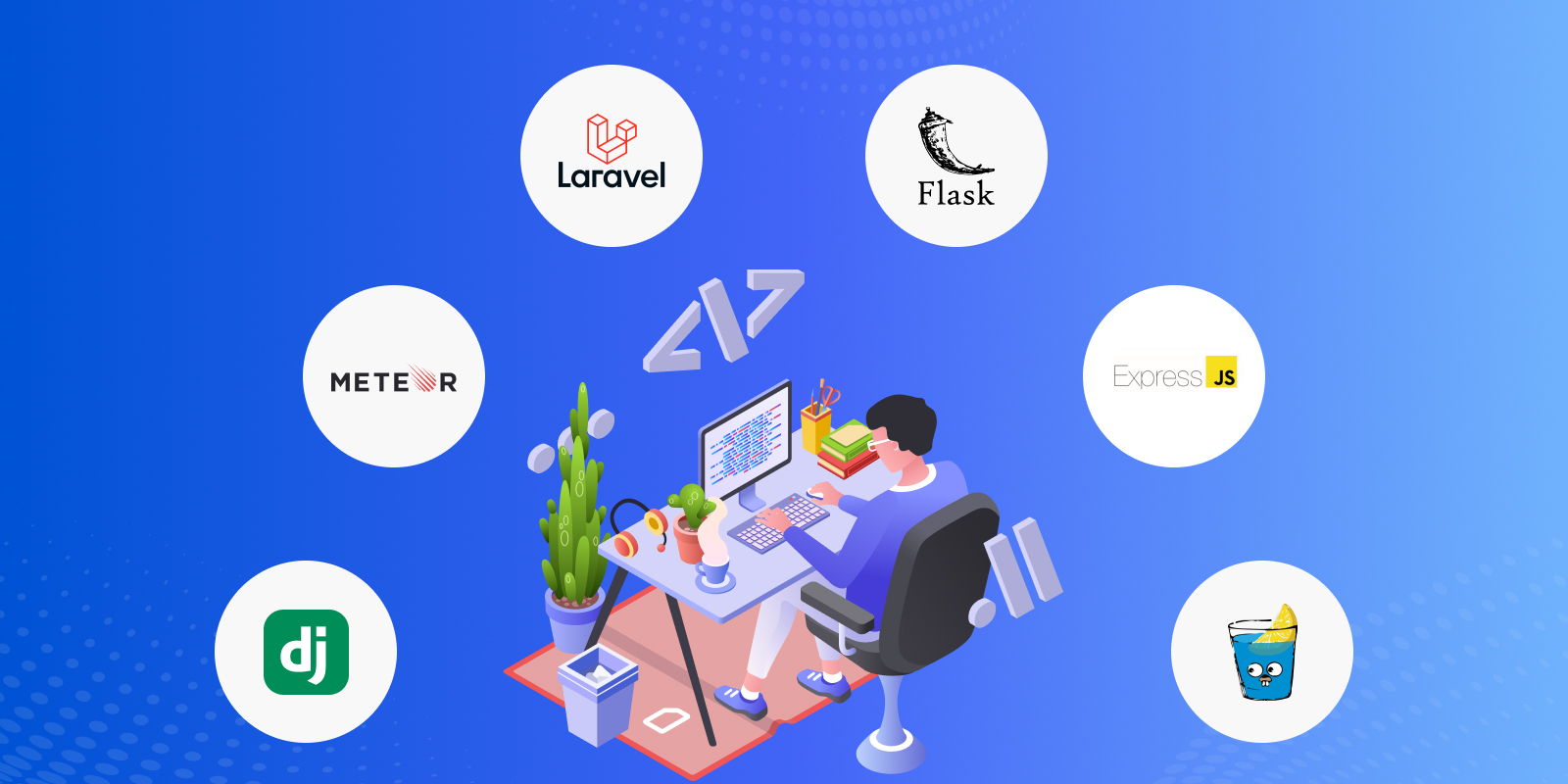
Here is the top backend framework to use in 2023:
A) Laravel:
Laravel is an open-source web framework for PHP that follows the MVC (Model View Controller) architectural pattern. It provides a modular structure for building websites which helps reduce code repetition and makes it easier to write secure, maintainable applications.
Laravel has many features, including built-in support for authentication, authorization, routing, database operations, queuing tasks, testing, and deployment tools. It has a rapidly growing community of developers who contribute modules and plugins, provide documentation, and tutorials, and answer questions on forums such as Stack Overflow.
Examples of the most popular websites that use Laravel are Discord, NPM, TortoiseGit, and others.
What are the main features of Laravel:
1. Eloquent ORM (Object-Relational Mapping): Eloquent provides a simple ActiveRecord implementation for working with databases using objects instead of raw SQL queries. This makes database tables interaction quicker and more efficient.
2. Blade Templating Engine: Blade is a simple yet powerful templating engine that simplifies HTML output and extends the capacity of plain PHP syntax. Its built-in components enable you to create responsive, reusable UI elements quickly and easily.
3. Dependency Injection: Laravel follows the dependency injection pattern. It allows developers to write loosely coupled code, integrate dependencies and help them write better code.
4. Middleware Support: Laravel’s middleware system enables developers to handle HTTP requests and responses efficiently. It allows them to perform simple tasks such as authentication, logging, caching, and routing.
5. Routes Management: Laravel has a route management system and supports RESTful routes and custom URLs based on your application’s needs.
6. Artisan Command Line Tool: Artisan is Laravel's command line tool that helps in rapid development by generating boilerplate files like models, controllers, views, migrations, and more.
7. Built-in Testing Tools: Laravel includes testing support through the unit and functional tests. These tools help ensure clean, well-written code with minimal bugs.
8. Authentication System: Laravel’s built-in authentication system helps developers implement password reset functionality, user registration, login/logout, CSRF protection, and role-based access control directly from the controller.
B) Django:
It is an open-source Python-based web framework that efficiently develops database-driven, complex websites. There are numerous apps built on Django. Some of them are Instagram, Spotify, and Dropbox. Django is the best option for the development of needed high-quality web designs.
According to StackOverflow Developer Survey, Django is one of the most popular web frameworks and technologies. Whereas GitHub has over 680,810 repositories in Django.
What are the key features of Django?
1. Object Relational Mapping (ORM): Enable developers to communicate easily with the database using Python objects instead of SQL queries. It manages the database and streamlines communication between the database and the application.
2. URL Handling: With the flexibility offered by Django in the URL routing system, it is easier for developers to create URLs in human-understandable and SEO-friendly ways that will enable easy app navigation.
3. Scalability: Django has to cache and code reusability features that make it a scalable framework. It helps developers develop websites that can handle high traffic.
4. Built-in Security: Django offers high security against SQL injections, CSRF attacks, and XSS, making it the best option for developing secure web apps.
5. Django Admin: Django allows programmers to build an admin panel effortlessly. Furthermore, developers can use its intuitive interface and dashboard to manage app data without external coding.
C) Flask:
Flask is a lightweight web development framework for Python that makes it easy to build robust APIs, websites, and complex applications. It has a simple and modular architecture, which makes it ideal for a small project.
Flask utilizes a microframework design pattern that allows developers to take more control over the final product and reduces unnecessary overhead.
What are the main features of Flask?
1. Micro-framework: Flask follows the micro-framework design pattern and ensures that you only include the components you need to develop your application, providing flexibility without excess baggage.
2. Simple and intuitive: Flask is designed to be user-friendly and straightforward due to its clean and uncluttered syntax. It is easy to learn and pick up the basics very quickly.
3. Extensible: Despite its simplicity, Flask can be extended to support more advanced functionality through third-party packages or by writing custom code. You can always scale your project upwards as per your needs.
4. Compatible with multiple databases: Flask is compatible with various data storage such as SQLite, MySQL, PostgreSQL, and more.
5. Community support: As one of the most widely used web development frameworks, Flask enjoys widespread adoption among the developer community. There are countless resources available online, such as tutorials and documentation.
D) Express.js
Express.js is a server-side JavaScript framework that creates web applications and API services. Based on Node.js, Express.js is an open-source environment used for developing server-side software using JavaScript. Express.js is a minimalist framework designed to provide enough structure to enable efficient web development while allowing maximum freedom to developers.
What are the main features of Express.js?
1. Routes Handling Capabilities: Express.js makes it effortless to set up dynamic routes in your web apps with just a few lines of code. Dynamic routes enhance UX and SEO for better engagement with visitors and search engines alike.
2. Middleware Support: Middleware functions play a crucial role in express.js. It enables developers to manipulate requests and responses according to requirements. They can tackle issues such as error handling, authentication, logging, and rate limiting.
3. Strong Community Support: The Express.js community is vast and incredibly responsive. Developers can get support from various channels like StackOverflow, Reddit, blog articles, YouTube videos, workshops, and conferences.
4. Lightweight: A lightweight nature is one of the primary attractions of Express.js, since it does not introduce extra complexities like large frameworks may do. Its narrow size allows developers to apply lean practices and fine-grained controls throughout a wide range of environments.
5. Learnability and Familiarity: Express.js employs familiar languages like JavaScript (Node.js), HTML, CSS, and JSON, which eases learning curve difficulties for new developers or those looking to transition between frontend and backend roles. Being able to reuse skills is immensely valuable professionally.
6. Compatibility and Flexibility: From cloud hosting to local machine development, Express.js plays works well with most technologies commonly found today. Its adaptable design keeps pace with evolving technology landscapes for increased compatibility across diverse infrastructure scenarios.
E) Meteor.js
Meteor.js is an open-source platform for building web and mobile apps. It provides real-time automatic bidirectional synchronization between the client and the server without additional code. It was first released in 2012 and has gained popularity due to its simplicity and reactive programming paradigm.
What are the main features of Meteor.js?
1. Real-Time Data Syncing: Provides real-time communication between clients and servers using the Distributed Data Protocol (DDP) for instant synchronization of data changes.
2. Two-Way Binding: Allows two-way binding between templates and model data for easier and more accurate updating of views.
3. Built-in MongoDB Compatibility: Integrates with MongoDB as its default database and ensures smooth use cases.
4. Automatic Deployment: Simplified deployment processes with automation of tasks like build generation, code optimization, and environment configuration.
5. Mobile Development Support: Developers can leverage Apache Cordova plugin support to create hybrid mobile applications.
To conclude:
Now that you know about the different web frameworks available, you can choose the one that suits your business the most. Moreover, you should take the help of experts to select the framework for your business. They are well-versed with the latest technology, and by understanding your requirements, they can guide you as per your business requirements.
If you are looking for a web development company that can help you enhance your business, contact us. We are one of the leading custom software development companies in the market. We have a team of professionals who have helped numerous clients globally and have helped them empower their businesses.






